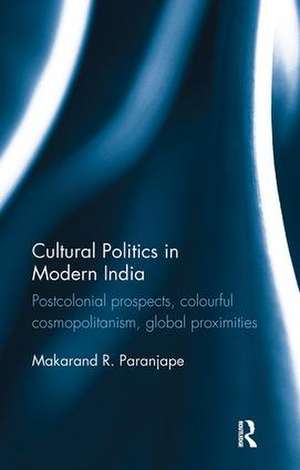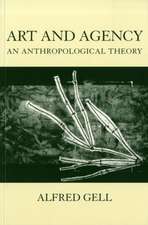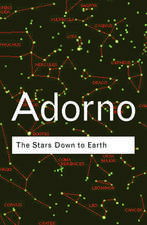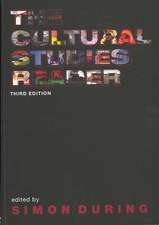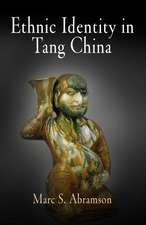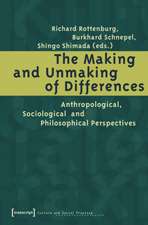Cultural Politics in Modern India: Postcolonial prospects, colourful cosmopolitanism, global proximities
Autor Makarand R. Paranjapeen Limba Engleză Paperback – 24 ian 2018
| Toate formatele și edițiile | Preț | Express |
|---|---|---|
| Paperback (1) | 449.41 lei 43-57 zile | |
| Taylor & Francis – 24 ian 2018 | 449.41 lei 43-57 zile | |
| Hardback (1) | 1056.28 lei 43-57 zile | |
| Taylor & Francis – 19 ian 2016 | 1056.28 lei 43-57 zile |
Preț: 449.41 lei
Nou
Puncte Express: 674
Preț estimativ în valută:
85.100€ • 90.01$ • 71.57£
85.100€ • 90.01$ • 71.57£
Carte tipărită la comandă
Livrare economică 31 martie-14 aprilie
Preluare comenzi: 021 569.72.76
Specificații
ISBN-13: 9781138488335
ISBN-10: 113848833X
Pagini: 314
Dimensiuni: 138 x 216 x 17 mm
Greutate: 0.45 kg
Ediția:1
Editura: Taylor & Francis
Colecția Routledge India
Locul publicării:Oxford, United Kingdom
ISBN-10: 113848833X
Pagini: 314
Dimensiuni: 138 x 216 x 17 mm
Greutate: 0.45 kg
Ediția:1
Editura: Taylor & Francis
Colecția Routledge India
Locul publicării:Oxford, United Kingdom
Public țintă
PostgraduateCuprins
Preface. Introduction Part I 1. The Future of the Past, the Past of the Future 2. Regaining the Indian Eye/I: The Rasas of the Past 3. The Third Eye and Two Ways of (Un)knowing 4. Aesthetics and Ideology: The State of the Art Part II 5. Tagore’s Viswa-Sahitya: Re-wor(l)ding the House of World Literature 6. ‘Natural Supernaturalism?’ The Tagore-Gandhi Debate on the Bihar Earthquake 7. Contrasting Peace Perspectives: Kant and Gandhi: A Trans-Civilizational Inquiry 8. Hind Swaraj in Our Times Part III 9. Transparency, Globalization, Integrality: Jean Gebser’s Several Wo(r)lds 10. The Reluctant Guru: R. K. Narayan and The Guide 11. A Poetry of Proportions: Nissim Ezeliel’s Quest for the Exact Name 12. Ramchandra Gandhi’s ‘Truths’: Non-Dual Mediations and Meditations. Index
Notă biografică
Makarand R. Paranjape is Professor of English at the Centre for English Studies, School of Language, Literature and Culture Studies, Jawaharlal Nehru University, New Delhi. He was the inaugural Eric Auerbach Visiting Chair in Global Literary Studies at the University of Tubingen, Germany, and served as the first ICCR Chair in Indian Studies at the National University of Singapore. His latest works includes The Death and Afterlife of Mahatma Gandhi (2014) and Swami Vivekananda: A Contemporary Reader (2015).
Recenzii
Paranjape is among the leading humanist intellectuals of his generation in India. In this volume he clarifies the circulations and crossings between Indian and global cultures—in all their novelties and quandaries—that every thinking Indian should reflect upon." — Prasenjit Duara, Director, Asia Research Institute, Singapore
"[A]n exemplary performance of cultural theory from the South. Engaging with significant figures from India's history of thought, Paranjape recalibrates cultural theory by allowing its central questions to be posed in terms set by its own intellectual actors. He never fails none the less to engage with an array of interlocutors from around the world, making his book a work of truly global scope." — Russell West-Pavlov, Professor of English, University of Tübingen
"Paranjape explores alter-cosmopolitanisms with rare skill and sensitivity. [The book] integrates habitual binaries of western paradigms, and enshrines what may be called 'scriptural modernities'." — Sachidananda Mohanty, Vice-Chancellor, Central University of Odisha
"[A]n exemplary performance of cultural theory from the South. Engaging with significant figures from India's history of thought, Paranjape recalibrates cultural theory by allowing its central questions to be posed in terms set by its own intellectual actors. He never fails none the less to engage with an array of interlocutors from around the world, making his book a work of truly global scope." — Russell West-Pavlov, Professor of English, University of Tübingen
"Paranjape explores alter-cosmopolitanisms with rare skill and sensitivity. [The book] integrates habitual binaries of western paradigms, and enshrines what may be called 'scriptural modernities'." — Sachidananda Mohanty, Vice-Chancellor, Central University of Odisha
Descriere
Evolving a form of unique cultural politics and aesthetics, key writers and thinkers engendered global proximities in Indian neighbourhoods. From the colonial times to the present, the trajectory of alternative globalization and modernity shows how Indian ideas, texts, and cultural expressions interacted with a wider world, vectored by the creative insights of figures like Tagore, Gandhi, Aurobindo, Kosambi, Narayan, Ezekiel, Spivak and others.
